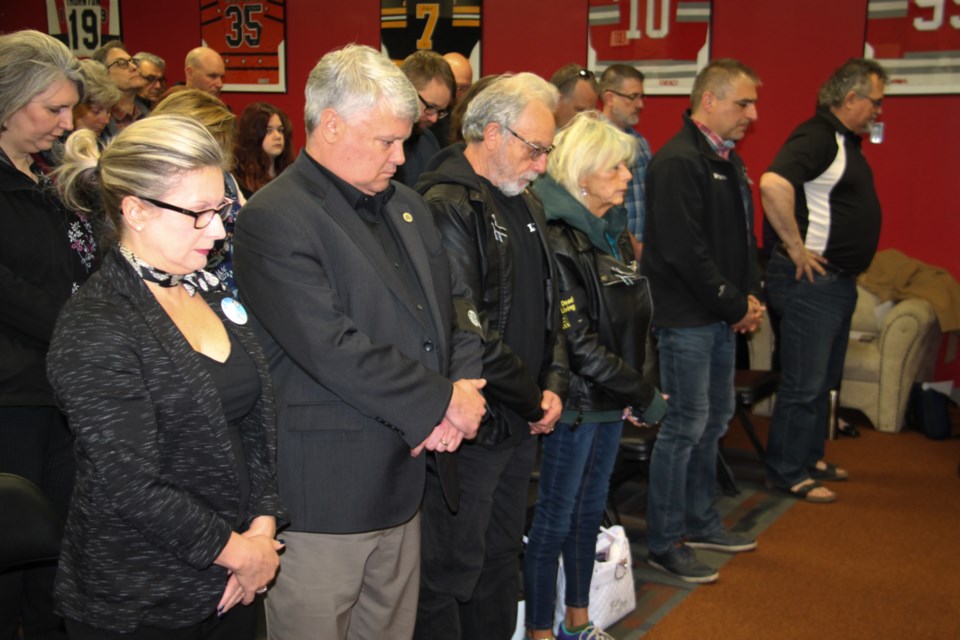“In 2018, we found there were 228 workplace-related fatalities in Ontario. That’s an unacceptable number. There should be no one dying at work.”
That from Michele McCleave-Kennedy, Sault Ste. Marie and District Labour Council president, delivering opening remarks at Sunday’s National Day of Mourning ceremony, in remembrance of workers who have been killed, injured or suffered illness due to workplace related dangers and occupational exposures.
McCleave-Kennedy, an educational assistant, said she has suffered eight injuries in her workplace over the past 15 years, including a concussion sustained three weeks ago when she was attacked by a student.
Lost time injuries in the province have increased by 33 per cent since 2015, McCleave-Kennedy said.
Figures weren’t immediately available in terms of local workplace fatalities, but McCleave-Kennedy, speaking to SooToday, said local workplace injuries last year were in “the thousands.”
Sunday’s ceremony, including a minute of silence for fallen workers at 11 a.m., took place at GFL Memorial Gardens Bumbacco Room, the National Day of Mourning held each April 28th.
“I’m scared young workers and precarious workers are not going to be covered. We don’t have the workplace safety training we had 20 years, or even 10 or five years ago,” McCleave-Kennedy said to a room packed with local and regional labour union officials and union members.
“We need to push back against the changes to labour legislation and talk to our young workers and let them know how they can be safe and hopefully we can make a change.”
Mike Da Prat, United Steelworkers Local 2251 president, said “we have to lay the issue squarely on the government.”
“We can’t keep sugar coating this issue. We hear about stress, but part of the problem with the stress is that young people are ill-prepared for the work environment which they find themselves,” calling for employers and senior levels of government to ensure more on the job training and health and safety training at Algoma Steel and across the board.
Sault MP Terry Sheehan said workplace dangers and stress led him to introduce his precarious work motion, known as Motion M-194, which passed in the House of Commons unanimously 293-0 Feb. 28.
“Precarious work includes work where, a lot of times, there is no union protection, no benefits or sick leave, people working long hours from contract to contract. The manager does not turn that into full time employment to save money. In fact, sometimes within the federal and provincial governments, managers incentify to save costs through performance awards so there’s not an incentive to hire full time, so it’s a reverse incentive.”
“That leads to sickness, injury, stress and breakdown in family relationships...so I was pleased when the motion passed unanimously and it went to committee,” Sheehan said.
“We’re now moving forward on this with some recommendations because we have to formally identify precarious work and work on all the symptoms and problems that are causing sickness and stress. We as a government have not caught up to it,” Sheehan said, adding workers in the new information technology based economy in particular are suffering that stress.
Lisa Vezeau-Allen, Sault acting mayor, agreed with Sheehan, stating “precarious work is a huge issue in our workplace today.”
“I’ve seen people suffering from stress and anxiety,” Vezeau-Allen said, adding the stigma surrounding mental health issues among employees in the workplace must be removed.
“With each person we have lost in these preventable workplace tragedies, the effect is multiplied on their families and loved ones left behind. Each death changes many lives forever,” said Dan Cooper, of USW District 6.
Cooper, however, pointed to some good news in that in Ontario in 2018, there were no workplace fatalities in the mining sector thanks to union efforts to raise awareness of workplace safety.
